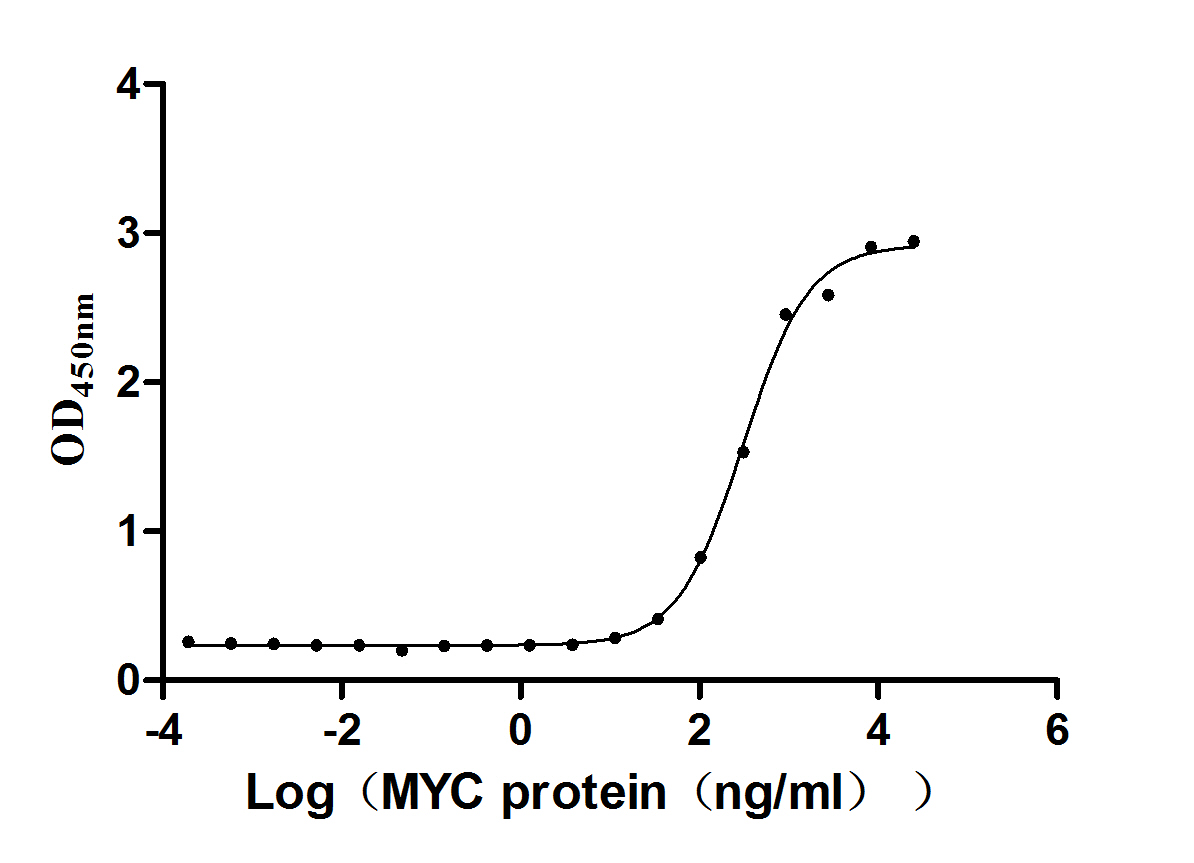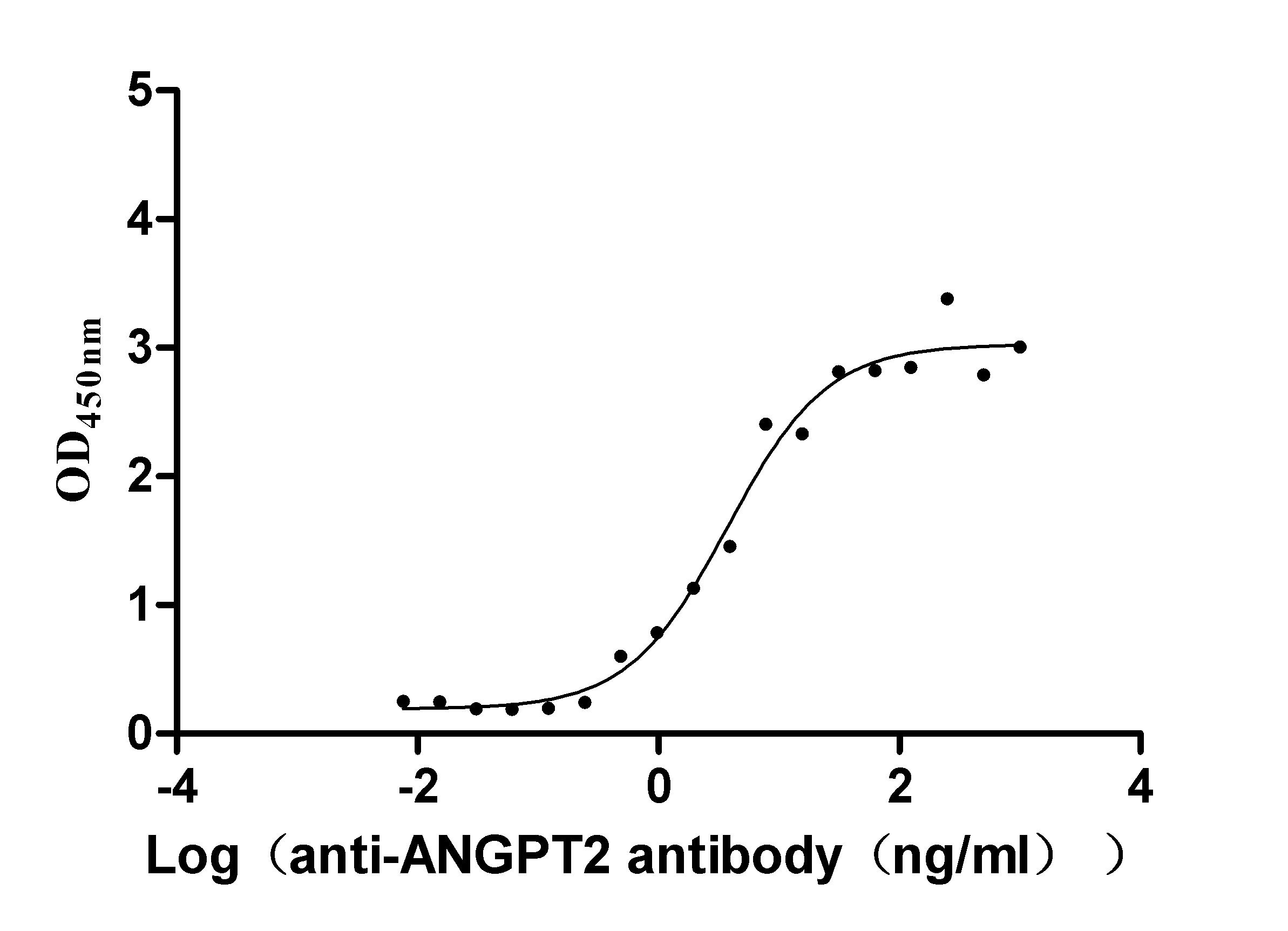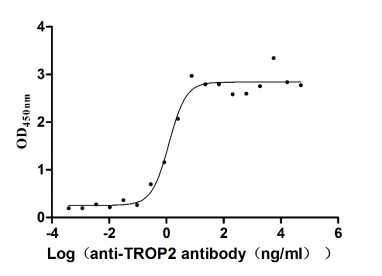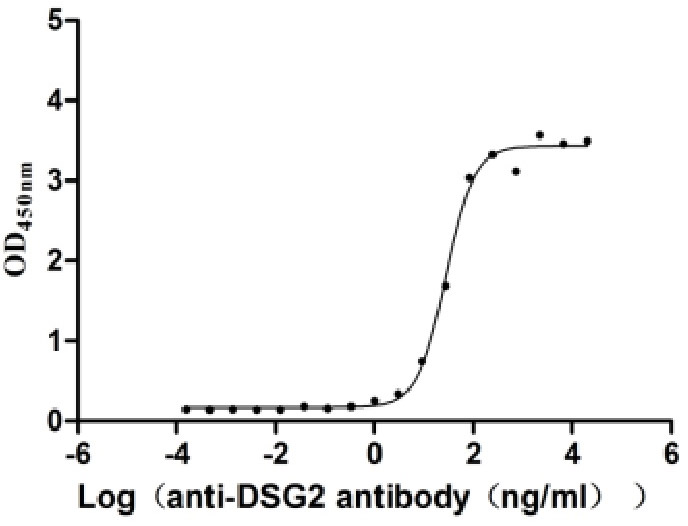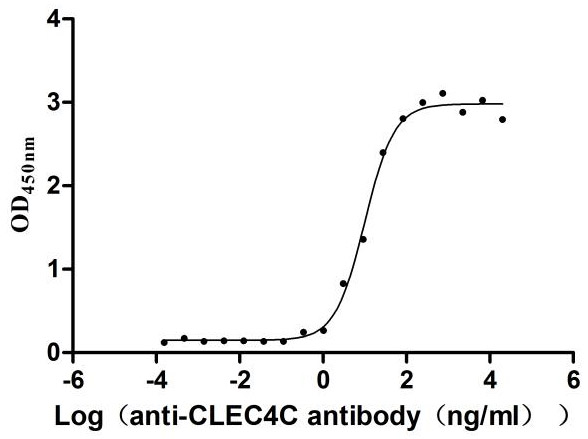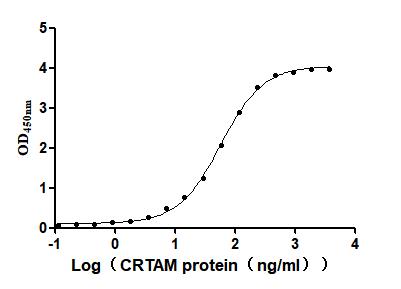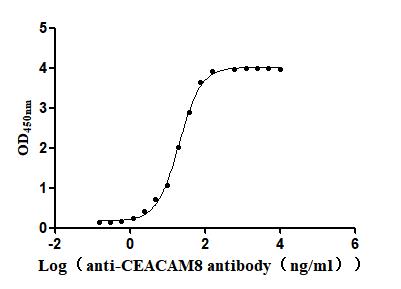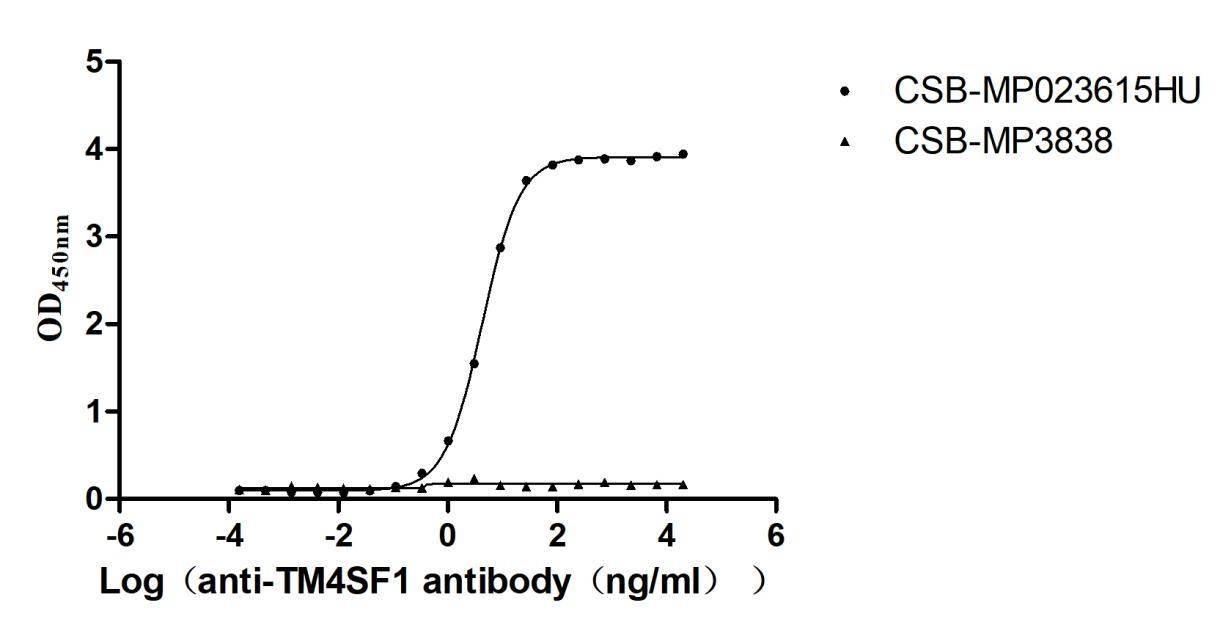Recombinant Human Glutathione S-transferase Mu 1 (GSTM1)
-
货号:CSB-YP009979HU
-
规格:
-
来源:Yeast
-
其他:
-
货号:CSB-EP009979HU-B
-
规格:
-
来源:E.coli
-
共轭:Avi-tag Biotinylated
E. coli biotin ligase (BirA) is highly specific in covalently attaching biotin to the 15 amino acid AviTag peptide. This recombinant protein was biotinylated in vivo by AviTag-BirA technology, which method is BriA catalyzes amide linkage between the biotin and the specific lysine of the AviTag.
-
其他:
-
货号:CSB-BP009979HU
-
规格:
-
来源:Baculovirus
-
其他:
-
货号:CSB-MP009979HU
-
规格:
-
来源:Mammalian cell
-
其他:
产品详情
-
纯度:>85% (SDS-PAGE)
-
基因名:GSTM1
-
Uniprot No.:
-
别名:EC=2.5.1.18; Glutathione S-transferase Mu 1; GST class-mu 1; GST HB subunit 4; GST1; Gstm1; GSTM1-1; GSTM1_HUMAN; GSTM1a-1a; GSTM1b-1b; GTH4; GTM1; H-B; LIVER AND FIBROBLAST GST1; MU; MU-1
-
种属:Homo sapiens (Human)
-
蛋白长度:Full length protein of Isoform 2
-
表达区域:1-181
-
氨基酸序列MPMILGYWDIRGLAHAIRLLLEYTDSSYEEKKYTMGDAPDYDRSQWLNEKFKLGLDFPNL PYLIDGAHKITQSNAILCYIARKHNLCGETEEEKIRVDILENQTMDNHMQLGMICYNPEF EKLKPKYLEELPEKLKLYSEFLGKRPWFAGNKGLEKISAYMKSSRFLPRPVFSKMAVWGN K
-
蛋白标签:Tag type will be determined during the manufacturing process.
The tag type will be determined during production process. If you have specified tag type, please tell us and we will develop the specified tag preferentially. -
产品提供形式:Lyophilized powder
Note: We will preferentially ship the format that we have in stock, however, if you have any special requirement for the format, please remark your requirement when placing the order, we will prepare according to your demand. -
复溶:We recommend that this vial be briefly centrifuged prior to opening to bring the contents to the bottom. Please reconstitute protein in deionized sterile water to a concentration of 0.1-1.0 mg/mL.We recommend to add 5-50% of glycerol (final concentration) and aliquot for long-term storage at -20℃/-80℃. Our default final concentration of glycerol is 50%. Customers could use it as reference.
-
储存条件:Store at -20°C/-80°C upon receipt, aliquoting is necessary for mutiple use. Avoid repeated freeze-thaw cycles.
-
保质期:The shelf life is related to many factors, storage state, buffer ingredients, storage temperature and the stability of the protein itself.
Generally, the shelf life of liquid form is 6 months at -20°C/-80°C. The shelf life of lyophilized form is 12 months at -20°C/-80°C. -
货期:Delivery time may differ from different purchasing way or location, please kindly consult your local distributors for specific delivery time.Note: All of our proteins are default shipped with normal blue ice packs, if you request to ship with dry ice, please communicate with us in advance and extra fees will be charged.
-
注意事项:Repeated freezing and thawing is not recommended. Store working aliquots at 4°C for up to one week.
-
Datasheet :Please contact us to get it.
相关产品
靶点详情
-
功能:Conjugation of reduced glutathione to a wide number of exogenous and endogenous hydrophobic electrophiles. Involved in the formation of glutathione conjugates of both prostaglandin A2 (PGA2) and prostaglandin J2 (PGJ2). Participates in the formation of novel hepoxilin regioisomers.
-
基因功能参考文献:
- Patients having Glutathione S-transferase M1 allele and Apolipoprotein E E2 allele are predisposed to oxidative stress-induced cardiac injury. PMID: 30095041
- The 6-TGN levels were not affected by the GSTM1 genotype. PMID: 28045129
- Complex Haplotypes of GSTM1 Gene Deletions Harbor Signatures of a Selective Sweep in East Asian Populations. PMID: 30061374
- These results illustrate the potential association between rs9642880 G > T and survival in hepatocellular carcinoma patients who received radiotherapy treatment. PMID: 29396413
- GSTM1 and GSTT1 gene polymorphisms are not associated with lipid levels in endogenous hypertriglyceridemia in Chinese population. PMID: 29896743
- This study suggests that GSTM1 active and GSTT1 null genotype combination might be a risk factor in developing mitochondrial disease. PMID: 29235020
- The meta-analysis showed that glutathione S-transferases GSTT1 and GSTM1 null polymorphisms are risk factors for breast cancer [Meta-analysis]. PMID: 29932073
- individuals carrying GSTM1 null variant showed protective role against seizure. PMID: 30179425
- Our meta-analysis supports that CYP1A1 exon7 polymorphism might contribute to individual susceptibility to esophageal cancer in the Chinese population. Gene-gene interaction analysis found a synergistic interaction between CYP1A1 mutation genotypes and GSTM1 deletion genotype. PMID: 28164573
- The effects of GSTM1/GSTT1 genes on diabetes mellitus type 2 risk are gender dependent and may be triggered by tobacco smoking. PMID: 29111615
- GSTM1 gene polymorphism is associated with liver diseases. PMID: 29582627
- this is the first report on the GSTM1and GSTT1frequency distribution among the tribal population of western India. PMID: 29666321
- s conclude that maternal GSTM1/GSTT1 gene polymorphisms present an impact on birth weight, being involved in the neonatal nutritional status. PMID: 29556619
- VEGF, VEGFR2 and GSTM1 polymorphisms in outcome of multiple myeloma patients treated with thalidomide-based regimens PMID: 28665417
- Based on our meta-analysis, the GSTM1 null genotype is a risk factor for CRC. PMID: 29516983
- Indel variants of GSTM1 were typed in breast cancer patients and normal controls. GSTM1 deletion seemed to marginally increase breast cancer risk in Mexican women. PMID: 29267651
- The current analyses suggests significant association was found between GSTM1 variants and the risk of childhood acute lymphoblastic leukemia (ALL), while no association were found between GSTT1 and GSTP1 Ile105Val polymorphism and childhood ALL risk PMID: 28176509
- In conclusion, the present study indicated that GSTT1 deletion was associated with increased recurrence risk of breast cancer, while GSTM1 correlated with worst prognosis parameters at diagnosis, but was negatively associated with recurrence risk in luminal subtype samples. PMID: 28455582
- Homozygous deletion of GSTM1 is associated with slower HIV disease progression. PMID: 29795558
- The patients homozygous for the GSTM1 null alleles showed a 3.5 increased risk of Alzheimer's disease PMID: 29072550
- Our findings suggest that the GSTM1 (-) allele may be considered as a key factor for the development of carbamazepine-induced hepatotoxicity PMID: 29523098
- We observed an association between GSTM1 and Stevens Johnson Syndrome Toxic Epidermal Necrolysis. PMID: 28689274
- Using PCR, analyzed copy number variations in glutathione S-transferase M1 (GSTM1) gene and determined their genetic contribution in Tunisian rheumatoid arthritis (RA). PMID: 28703442
- GSTM1 showed a significant association with several GV, arterial stiffness, and SV balance indexes. In particular, the GSTM1 deletion positively correlates with lower values of these indexes when compared to the presence of the gene. PMID: 29452132
- Individuals with ASD (autism spectrum disorder)showed a significant diminished level of reduced glutathione, however, the distribution of GSTT1, GSTM1, and GSTP1 polymorphisms was not found to be associated with autism in this study population. PMID: 29072241
- GSTM1 and GSTT1 gene polymorphisms are closely correlated with the pathogenesis of COPD. PMID: 28951769
- Analyses of the GSTM1 polymorphisms demonstrated that there was a significantly increased Esophageal Carcinoma risk in GSTM1 null genotype carriers (OR = 1.319, 95% CI = 1.125-1.546, p for heterogeneity <0.001).In the GSTM1-GSTT1 interaction analysis, we discovered remarkably enhanced EC risk for patients with the GSTM1 and GSTT1 dual null genotypes (OR = 1.962, 95% CI = 1.178-3.268, p for heterogeneity <0.001) PMID: 29215312
- The findings indicate that GSTM1 may be a causal gene of both anti-tuberculosis drug-induced hepatotoxicity and schizophrenia. (Meta-analysis) PMID: 27580934
- findings indicated that GSTM1 polymorphism might affect the association between exposure to perfluorinated compounds (PFCs) and birth weight, suggesting the effect of genetic susceptibility on the relationship between prenatal PFCs exposure and birth outcomes PMID: 27206125
- This study showed a significant trend towards an association with the combination of the GSTM1/GSTT1 double null polymorphism and generalized vitiligo. Individuals with GSTM1 null/GSTT1+ heterozygosis have a 2.97 odds protection from having generalized vitiligo compared with patients. PMID: 29641697
- The findings are consistent with the notion that the frequency of homozygous carriers of the GSTM1(0/0)/GSTT1(0/0) genotype is increased among males with reproductive problems. PMID: 28744640
- The neonates who had GSTT1 or GSTM1 polymorphism were associated with an increased risk of being small for gestational age SGA. A combination of the GSTT1 and GSTM1 null genotype exacerbated the effect of maternal environmental tobacco smoke exposure on SGA more than the presence of either genotype alone (odds ratio=8.90, 95% confidence interval=1.00-79.5). PMID: 28216421
- GSTT1 and GSTM1 may modulate DNA damage levels of p53 gene when exposed to polycyclic aromatic hydrocarbons. PMID: 28426525
- Carriers of GSTM1-null and GSTP1-variant genotypes are in increased risk of RCC development. On the contrary, GSTM1-null genotype is associated with favorable postoperative prognosis in ccRCC. PMID: 28284893
- Suggest that the donors and recipients' GSTM1 polymorphism may be a major risk factor for oxidative stress and delayed graft function in kidney transplant recipients. PMID: 28575886
- The combination of glutathione S-transferase theta 1 (GST T1) null/glutathione S-transferase mu 1 (GST M1) wild genotype was significantly more frequent in diabetic patients than controls, indicating a significantly increased risk of type 1 diabetes mellitus (T1DM). PMID: 27908841
- This meta-analysis demonstrates that the GSTM1-null, GSTT1-null, and GSTM1/GSTT1 double-null genotypes are associated with increased bladder cancer risk. PMID: 27911277
- the study findings allow us to conclude that the deletion genotypes of GSTM1 and GSTT1 are associated with infertility in Russian men. PMID: 29376593
- this meta-analysis indicates that the combined effects of the GSTM1 and GSTT1 polymorphisms are associated with increased lung cancer risk in Asians, Caucasians, and Indians. PMID: 28427236
- Our results suggest that GSTM1 and GSTT1 gene deletion/null gene polymorphisms are not a key modulators of the risk of developing colorectal cancer in Kashmiri population. PMID: 28485343
- People with glutathione s-transferase enzyme gene variations (GSTM1 and GSTT1 deletions) are at a higher risk for developing multiple sclerosis, which can be due to a decrease in enzymatic activity and their levels in nerve cells and the brain. PMID: 29055472
- The GSTM1-null genotype might be associated with higher risk for early onset severe mental disorders. PMID: 27114251
- Findings suggest that the GSTM1 null genotype is a risk modifier for cutaneous melanoma. PMID: 27540835
- We aimed to assess the impact of DE and allergen co-exposure on lung function and the influence of GSTM1 or GSTT1 variation.plasma protein carbonyl level 4h after co-exposure was higher in the individuals who have the GSTT1 null genotype PMID: 27151508
- Review/Meta-analysis: GSTM1 null genotype is a low-penetrant risk factor for developing breast cancer in the Chinese population. PMID: 28164656
- the presence of a GSTM1 *null and GSTT1 *null alleles were independent predictors for COPD in females. PMID: 27421065
- Our meta-analysis revealed strong association of rs1048943 in CYP1A1, but a suggestive association of deletion polymorphisms in GSTT1 and GSTM1 with lung cancer, which provides a comprehensive insight on the overall effect of the polymorphic variants, reported in various case-control studies on Indian population, on the risk of lung cancer development PMID: 29076184
- The selective effect of PEITC on detoxification in subjects lacking both GSTM1 and GSTT1 genes supports the epidemiologic findings of stronger protection by dietary isothiocyanates against the development of lung cancer in such individuals PMID: 27099270
- Polymorphisms of GSTM1 is associated with lung cancer. PMID: 28770368
- The loss of GSTM1 was significantly associated with incident kidney and heart failure, independent of traditional risk factors. These results suggest GSTM1 function is a potential treatment target for the prevention of kidney and heart failure PMID: 28720685
显示更多
收起更多
-
亚细胞定位:Cytoplasm.
-
蛋白家族:GST superfamily, Mu family
-
组织特异性:Liver (at protein level).
-
数据库链接:
HGNC: 4632
OMIM: 138350
KEGG: hsa:2944
STRING: 9606.ENSP00000311469
UniGene: Hs.301961
Most popular with customers
-
Recombinant Human papillomavirus type 16 Protein E7 (E7) (Active)
Express system: E.coli
Species: Human papillomavirus type 16
-
Recombinant Dog Angiopoietin-2 (ANGPT2) (Active)
Express system: Mammalian cell
Species: Canis lupus familiaris (Dog) (Canis familiaris)
-
Recombinant Human Tumor-associated calcium signal transducer 2 (TACSTD2), partial (Active)
Express system: Mammalian cell
Species: Homo sapiens (Human)
-
Recombinant Human Desmoglein-2 (DSG2), partial (Active)
Express system: Mammalian cell
Species: Homo sapiens (Human)
-
Recombinant Human C-type lectin domain family 4 member C (CLEC4C), partial (Active)
Express system: Mammalian cell
Species: Homo sapiens (Human)
-
Recombinant Mouse Cytotoxic and regulatory T-cell molecule (Crtam), partial (Active)
Express system: Mammalian cell
Species: Mus musculus (Mouse)
-
Recombinant Human Carcinoembryonic antigen-related cell adhesion molecule 8(CEACAM8) (Active)
Express system: Mammalian cell
Species: Homo sapiens (Human)
-
Recombinant Human Transmembrane 4 L6 family member 1(TM4SF1)-VLPs (Active)
Express system: Mammalian cell
Species: Homo sapiens (Human)


